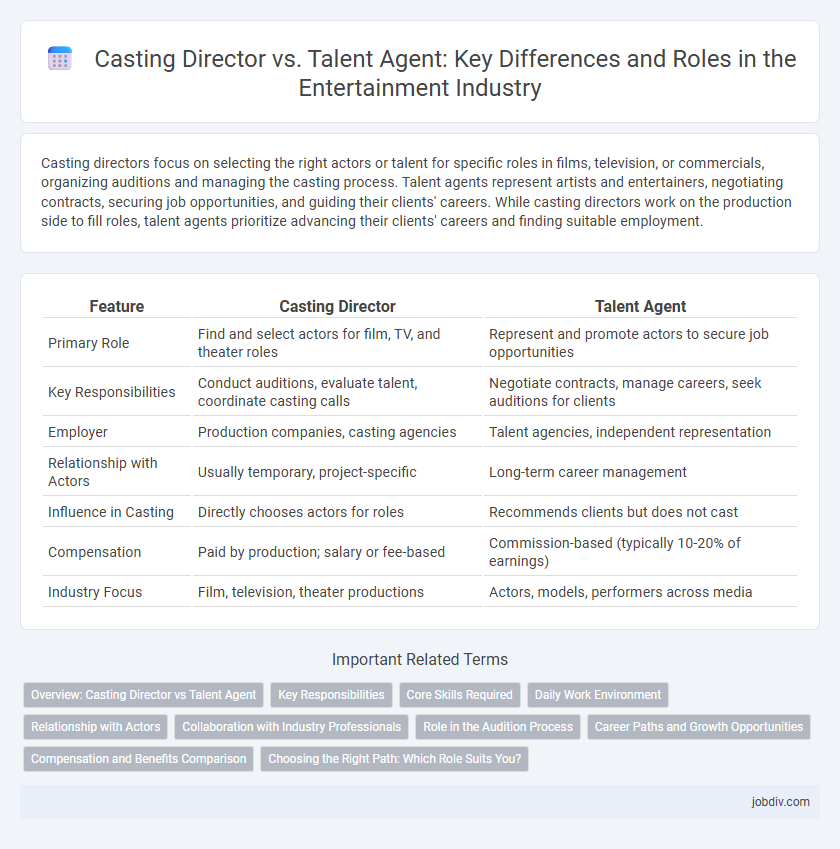Casting directors focus on selecting the right actors or talent for specific roles in films, television, or commercials, organizing auditions and managing the casting process. Talent agents represent artists and entertainers, negotiating contracts, securing job opportunities, and guiding their clients' careers. While casting directors work on the production side to fill roles, talent agents prioritize advancing their clients' careers and finding suitable employment.
Table of Comparison
| Feature | Casting Director | Talent Agent |
|---|---|---|
| Primary Role | Find and select actors for film, TV, and theater roles | Represent and promote actors to secure job opportunities |
| Key Responsibilities | Conduct auditions, evaluate talent, coordinate casting calls | Negotiate contracts, manage careers, seek auditions for clients |
| Employer | Production companies, casting agencies | Talent agencies, independent representation |
| Relationship with Actors | Usually temporary, project-specific | Long-term career management |
| Influence in Casting | Directly chooses actors for roles | Recommends clients but does not cast |
| Compensation | Paid by production; salary or fee-based | Commission-based (typically 10-20% of earnings) |
| Industry Focus | Film, television, theater productions | Actors, models, performers across media |
Overview: Casting Director vs Talent Agent
Casting directors specialize in selecting actors for specific roles in film, television, and theater productions, working closely with directors and producers to find suitable talent. Talent agents represent actors, musicians, and other performers, managing their careers by securing auditions, negotiating contracts, and promoting their clients to casting directors and producers. While casting directors control the selection process for roles, talent agents act as advocates and career managers for performers.
Key Responsibilities
Casting directors primarily focus on selecting actors for specific roles in films, television, and theater, organizing auditions, and collaborating with directors and producers to match talent to character requirements. Talent agents concentrate on representing actors, negotiating contracts, marketing their clients to potential employers, and managing career opportunities. Both roles are crucial in the entertainment industry, with casting directors shaping the creative process and talent agents driving professional growth.
Core Skills Required
Casting directors require expertise in script analysis, actor evaluation, and strong organizational skills to manage diverse auditions and select appropriate talent. Talent agents must excel in negotiation, networking, and career management to effectively promote and secure roles for their clients. Both roles demand deep industry knowledge and exceptional communication abilities to succeed in entertainment.
Daily Work Environment
A casting director's daily work environment revolves around script analysis, coordinating auditions, and collaborating with directors and producers to find the perfect actors for roles. Talent agents primarily spend their time negotiating contracts, managing their clients' careers, and scouting new talent to expand their rosters. Both roles require strong communication skills, but casting directors focus more on project-specific needs, while talent agents prioritize long-term career development for performers.
Relationship with Actors
Casting directors collaborate directly with actors during auditions to assess their suitability for specific roles, focusing on matching talent to the project's creative vision. Talent agents manage actors' careers by securing auditions, negotiating contracts, and providing ongoing support to enhance their professional growth. While casting directors prioritize project needs, talent agents emphasize long-term career development and client representation.
Collaboration with Industry Professionals
Casting directors collaborate closely with talent agents to discover and recommend suitable actors for specific roles, ensuring alignment between the creative vision and available talent. Talent agents provide casting professionals with access to a diverse roster of actors, facilitating efficient auditions and streamlined selection processes. Effective communication between casting directors and talent agents enhances project outcomes by matching the right performers to the right opportunities quickly and accurately.
Role in the Audition Process
Casting directors oversee the audition process by selecting actors who best fit the project's requirements and coordinating callbacks and screen tests. Talent agents represent actors by submitting them for auditions, negotiating contracts, and managing their clients' career opportunities. Both roles are essential, with casting directors controlling access to roles and talent agents advocating for their clients during auditions.
Career Paths and Growth Opportunities
Casting directors primarily focus on selecting actors for roles in film, television, and theater, building strong industry connections to influence project outcomes. Talent agents work to discover, represent, and advance actors' careers by negotiating contracts and seeking new opportunities across various entertainment sectors. Career growth for casting directors often leads to senior executive roles in production companies, while talent agents can progress to agency partners or managers with expanded client portfolios.
Compensation and Benefits Comparison
Casting directors typically earn a fixed salary or project-based fees, often benefiting from steady income and union protections, while talent agents work on commission, earning 10-20% of their clients' earnings, which can lead to higher but less predictable income. Talent agents gain significant benefits from networking opportunities and client success bonuses, whereas casting directors enjoy stability through ongoing contracts with production companies. Both roles have distinct compensation structures reflecting their unique contributions to the entertainment industry's talent acquisition process.
Choosing the Right Path: Which Role Suits You?
Casting directors focus on selecting actors for specific roles by analyzing scripts and understanding a project's creative vision, while talent agents represent and promote performers to secure job opportunities. Choosing the right path depends on whether you prefer working behind the scenes managing auditions and production needs or advocating for clients and negotiating contracts. Success in both roles requires strong industry connections, excellent communication skills, and deep knowledge of the entertainment market.
Casting Director vs Talent Agent Infographic

 jobdiv.com
jobdiv.com